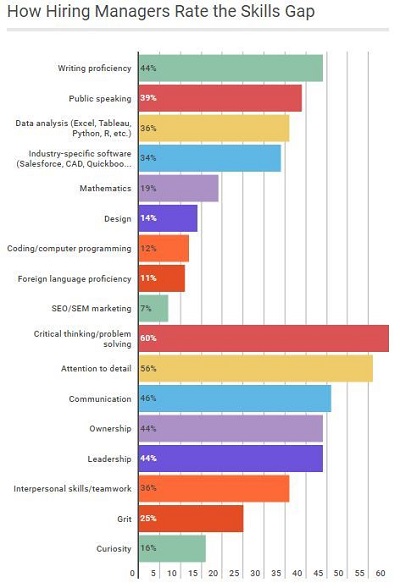In this blog, I’ll show you how to adapt your life experiences to the skills employers are looking for. It doesn’t matter if you’re not quite ready to look for a position yet: plan your career now, and you will thank yourself when the actual work of job applications begins.
When it comes to job ads there are two categories of job skills: hard and soft. Hard skills are the specific certificates, training or knowledge required in any given position. Soft skills are the personal attributes and characteristics that indicate emotional intelligence and adaptability.
Soft skills can include possessing communication and problem-solving skills as well as being a team player and flexible in the face of change. You can always do further training if a hard skill is missing, but it’s much more difficult to change a person’s attitude or personal attributes. Employers are increasingly relying on soft skills to differentiate between job seekers with the same hard skills, such as specific training or certification.
Find a career

You need to consider the environment where you are most likely to thrive. There’s no point being a medical assistant if you faint at the first sight of blood. Think about what you enjoy and, perhaps more importantly, what you do not.
The next step is to find as many job ads in your chosen field as possible and see what skills are required. What training, experience or personal attributes feature regularly? Create a list of all the hard and soft skills you find in this way. We’ll come back to this list later.
While you’re trawling through the job ads looking for the skills you need, also pay attention to job titles. Once you are ready to begin the job application process, these will become your key search terms for online job boards. When you have collected this information, you are well on your way to planning your career.
Apply your skills
So you have identified all the skills, qualifications and attributes your chosen profession requires. What next? You’ve never worked in this industry, so it is impossible to fulfill the requirements for the job, right? Wrong! Now that you have a list of the relevant soft skills it is time to apply them to your life.
Anyone can say they work well in a team or on their own, but the key is demonstrating the skill rather than just saying you possess it. Instead of simply saying you “work well in a team,” consider examples in your life that demonstrate teamwork.
An obvious example is playing in a sports team. However, there are other areas in life where you would also work in a team. Are you involved in church groups? A local club or society? A music group? A school committee?
Each of the above situations requires working and negotiating with others to achieve specific goals. Think about how you can use this real-life experience to your advantage. In each example, it is possible to say you worked with others to achieve a common goal, showed dedication and commitment and, quite possibly, perseverance in the face of defeat.
Once you start looking for examples of these soft skills in your life, you will see that you have experience in ways you never imagined.
Recommended for you
-
Radiology Technician Training
Take our accelerated Radiology Technician Training program at our Arlington campus and start a new career in as little as 8 months!
Pharmacy Technician Training Program
Our 100% online accelerated Pharmacy Technician Training program makes it possible for you to train for a new career in as little as 25 weeks!
Medical Assistant Program
Our 100% online fast track Medical Assistant program makes it possible for you to train for a new career in as little as 6 months!
Computer Network Technician
IT security refers to the measures taken to protect digital systems, networks, and information from theft, harm, or unauthorized interference.
Lead by example
My first ‘real’ job was as a medical receptionist. I had no administration experience, previously only working casual hospitality jobs. But my mom is a doctor, and when I was a child her doctor’s office was attached to our house. So when I said “I have good communication skills and a professional phone manner” I could demonstrate this by saying “I have been answering patient phone calls and booking appointments since I was four-years-old”.
Even worse than having no experience, I was a young mom: barely 20 with a one-year-old in tow. However, I could confidently say that I had time management and multitasking abilities by giving examples from my life of juggling a child, study, and work. While this experience was not ‘on-the-job,’ my childhood and parenthood were practical examples of the skills I possessed, and even landed me the job!
Create your skills list
Back to the list of hard and soft skills we created earlier. For each soft skill, write an example from your life that demonstrates this attribute. Not only will you have this as a handy reference when you write job applications and cover letters, you’ll have practical examples to use in interviews too.
You might come across a skill that you just don’t have. But don’t despair, you can still develop these abilities. If you are afraid to speak in public yet the career you want requires oral communication skills, try signing up for your local Toastmasters. If you feel you lack organizational abilities, volunteer to coach a local sporting team or plan an event at your local school.
If you don’t have the necessary certificates or knowledge for your career, create a step-by-step outline of how you are going to achieve each particular hard skill. This might involve enrolling in a career training course, securing a job placement or finding relevant volunteer work to gain experience.
Planning a career isn’t just about gaining qualifications. Everyone uses soft skills every day: the trick is learning how to spot them.
Next week, we will look at how to take advantage of technology and use social media to find new job opportunities.

Related Articles
















